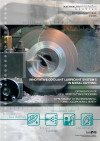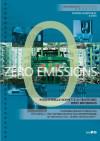Suchergebnisse
Critical Thinking about Critical Minerals
Im Rahmen dieser Untersuchung wurden mehrere Studien, die die Verfügbarkeit von Rohstoffen thematisieren, miteinander verglichen.
Analysis of the sealing water costs in the paper- and pulp industry
From all information should be made a tool for soul-searching, which allows all operators of pumps to calculate the possible reduction of costs (energy, cost of operaton, amount of fresh water, ...).
Kerzen aus nachwachsenden Rohstoffen von heimischer Landwirtschaft
Machbarkeitsstudie für Kerzen auf Basis nachwachsender Rohstoffe aus heimischer Landwirtschaft, die den heutigen Marktanforderungen entsprechen und mit den gängigen Fertigungstechniken hergestellt werden.
Semi-manual dismantling of small electric and electronic equipment
Improving the tecnology of manual dismantling processes of small electric and electronical appliances, used in social enterprises. Via software modules, developed do analise dismantling processes, from dismantling-factories to dismantling-parks.
Analyse der Sperrwasserkosten in der Papier- und Zellstoffindustrie
Aus den erhobenen Daten soll ein Werkzeug zur Selbstanalyse für die Betreiber von Stoffpumpen entwickelt werden, welches das Einsparungspotential (Energie, Betriebskostosten, Frischwassermenge, ... ) ermittelt.
Quantitative Indikatoren für die Biobasierte Industrie in Österreich
Im Zuge des Projekts Quantitative Indikatoren für die Biobasierte Industrie in Österreich wird mit Hilfe ausgewählter Strukturmaßzahlen, insbesondere des Revealed Comparative Advantage (RCA) Index, ein fundierter Überblick zum Status Quo der thematischen Spezialisierung der österreichischen biobasierten Industrie im internationalen Vergleich gegeben.
Berichte aus Energie- und Umweltforschung 12/1998 Herstellung von Biokunststoffen auf der Basis landwirtschaftlicher Rohstoffe

Eine sinnvolle Alternative zu Kunststoffen auf der Basis der Erdölchemie
Innovative Coolant Lubricant Systems In Metal Cuttin

Optimization of High Speed Cutting Processes Improvement of Environmental and Occupational Safety
Forschungsforum
3/2006
Herausgeber: BMVIT
Englisch, 6 Seiten
Downloads zur Publikation
Berichte aus Energie- und Umweltforschung 1b/2001Faser- und Färbepflanzen aus ökologischem Anbau - Anbauversuche Fasernessel

Ertragsleistung, Fasergehalt und Faserqualität von fünf Fasernesselklonen auf einem Biobetrieb in Niederösterreich
Mehrsprachig
Chemical modification of wood particles for high value wood plastic composites
Based on promising preliminary work feasibility and recycling strategy of the modifying process shall be evaluated economically and ecologically.
Berichte aus Energie- und Umweltforschung 12b/1997Erforschung der Verwendungsmöglichkeiten von Aschen aus Hackgut und Rindenfeuerungen - Anhang

Anhang zum Bericht aus Energie- und Umweltforschung 12a/1997
Berichte aus Energie- und Umweltforschung 14/2003 Kreislaufwirtschaft mit Produkten aus nachwachsenden Rohstoffen - Voraussetzungen und Strategien

Ziel dieser Untersuchung ist es, Problemfelder der Kreislaufschließung von Produkten aus nachwachsenden Rohstoffen zu identifizieren und Handlungsoptionen aufzuzeigen.
Berichte aus Energie- und Umweltforschung 12a/1997Erforschung der Verwendungsmöglichkeiten von Aschen aus Hackgut und Rindenfeuerungen

Holzasche als Sekundärrohstoff mit dünge- und bodenverbessernder Wirkung
Industrielle Schritte In Richtung Zero Emissions

Österreichische Forschung für abfall- und emissionsarme Industrieprozesse im Rahmen von "Fabrik der Zukunft"
Forschungsforum
3/2004
Herausgeber: BMVIT
Deutsch, 6 Seiten
Downloads zur Publikation
SERECARB - SElective REcovery of Calcium CARBonate in paper sludge (SUSPRISE Joint Call)
Developing a new process based on selective recovery of calcium carbonate from paper mill effluents and sludge, purification, conversion into precipitated calcium carbonate (PCC) and reuse as filler in paper making.
LifeCycle Tower - Energy efficient prefabricated multi-storey timber houses
Based on the results of previous research projects, the project at hand deals with the development of a wooden prefabricated module construction for energy efficient office buildings with up to 20 storeys. This sustainable system ensures cost certainty through the whole life cycle of the building.
Economical Utilisation of residues from slaughtering and meat processing
By utilising fresh raw materials, the process of producing meat and bone meal can be avoided and products of higher quality may be obtained.
RAILWASTE - Production of railway sleepers by mixed plastic waste (SUSPRISE Joint Call)
Production of railway crossties ("sleepers") from an alternative (renewable) raw material
"gugler! build & print triple zero" - Subprojekt 3: recyclingfähig konstruieren
Erarbeitung von Grundlagen und konkreten Vorschlägen für Hochbaukonstruktionen, die in höchstem Maß recyclierbar sind, mit besonderem Augenmerk auf Fügetechniken und Verbindungen sowie Konstruktionsvorschlägen samt ökologischer und bauphysikalischer Kennwerte sowie Kostenvergleichen wurden erstellt.
